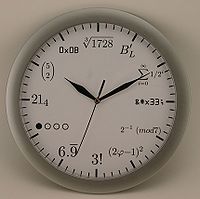Course:MATH103/Archive/2010-2011/207/Lectures/Lecture15
| Faculty of Science Department of Mathematics | |
|---|---|

| |
| Course Pages | |
| Course Policies | |
| Math Solvers | |
| Exams | |
| Quizzes | |
| Assignments | |
| Lectures | |
Lecture 15
Readings For This Lecture
- Chapter 7, pages 146 to 150 (up to subsection 7.8)
Summary
Group 9: Add a summary of the lecture in this space. Include examples, discussion, and links to external sources, if desired.
Exercises
1. Determine the probabilities of getting 1, 2, 3, or any number k ≤ 8 of Heads when a fair coin is tossed 8 times. Give your results in the form of a table.
Prob(1)=(8/1)*(1/2)^(1)*(1/2)^(8-1)
= (8/1)*(1/2)*(1/2)^(7)
Prob(2)=(8/2)*(1/2)^(2)*(1/2)^(6)
Prob(3)=(8/3)*(1/2)^(3)*(1/2)^(5)
prob(4)=(8/4)*(1/2)^(4)*(1/2)^(4)
Prob(5)=(8/5)*(1/2)^(5)*(1/2)^(3)
Prob(6)=(8/6)*(1/2)^(6)*(1/2)^(2)
Prob(7)=(8/7)*(1/2)^(7)*(1/2)^(1)
Prob(8)=(8/8)*(1/2)^(8)*(1/2)^(0)
2. Suppose the coin in question 1 is not fair, so that the probability of heads is . Determine the probability of getting exactly 3 heads in a total of 8 tosses.
Using Bernoulli trials = (N/K)*P^(K)*Q(N-K)
=(8/3)*(0.45)^(3)*(0.55)^(5)
3. Give a table for the cumulative distribution corresponding to the 8 coin toss experiment for a fair coin.